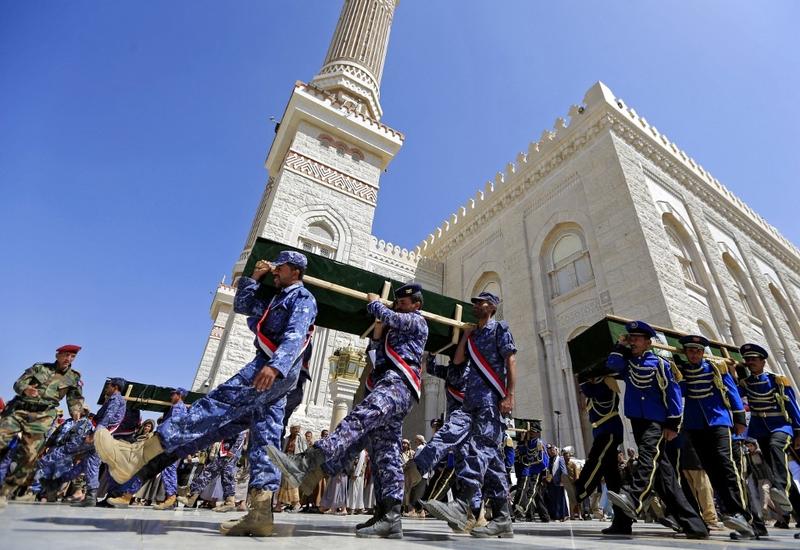 Forces loyal to Yemen's Huthi rebels carry coffins of fighters killed in battles with Saudi-backed government troops in the Marib region, during a mass funeral held on March 23, 2021 outside Sanaa's Al-Saleh mosque. (MOHAMMAD
HUWAIS / AFP)
Forces loyal to Yemen's Huthi rebels carry coffins of fighters killed in battles with Saudi-backed government troops in the Marib region, during a mass funeral held on March 23, 2021 outside Sanaa's Al-Saleh mosque. (MOHAMMAD
HUWAIS / AFP)
In Washington and Riyadh, there’s growing momentum behind efforts to end Yemen’s war. But in the mountains that guard the conflict’s latest prize, it’s the fighting that is intensifying and it could make diplomacy futile.
“We don’t care about all this talk of peace,” said Abdulrehman Ahmed, a soldier with Yemeni government forces repulsing a push by Iran-backed Houthi fighters to capture oil-rich Marib province. “We’re fully ready to fight until the end.”
The attack on Marib is “implementing the will and orders of God,” said senior Houthi leader Mohammed Al-Bukhaiti. It’s the “gate to Jerusalem”
Ahmed’s on the most volatile frontline of a war that’s spread death, disease and hunger for six years, fueled by the Middle East’s predominant feud between US ally Saudi Arabia and foe Iran.
ALSO READ: Saudi-led coalition destroys Houthi drones launched at kingdom
The Biden administration wants to bring it to an end, an accomplishment that would help ease its wider dispute with Iran. So does Saudi Arabia as it faces escalating Houthi attacks on oil facilities for its heavily criticized military role propping up Yemen’s internationally recognized government. The Houthis sense a different kind of breakthrough.
They view Marib, 120 kilometers (75 miles) east of Yemen’s capital, Sana’a, as a potential turning point in a largely deadlocked conflict. Houthi missiles pound its major city, while the Saudi-led coalition pummels rebel positions elsewhere to ease the pressure.
Seizing Marib, a key provider of fuels that’s connected by an oil pipeline to the port at Hodeidah, could allow the Houthis to push south and closer to their ultimate goal of controlling the country. At the very least, it would strengthen their hand at future peace talks.
ALSO READ: Saudi Arabia proposes Yemen ceasefire after oil attacks
The attack on Marib is “implementing the will and orders of God,” said senior Houthi leader Mohammed Al-Bukhaiti. It’s the “gate to Jerusalem.”
UN Role
The battle reflects the tortuous path peace efforts face. President Joe Biden has suspended sales of offensive weapons to Saudi Arabia, taken the Houthis off a terrorism list to facilitate aid, and deployed an envoy who’s presented a peace plan. The Saudis on March 22 outlined a similar proposal.
It includes a cease-fire under United Nations supervision, arrangements for sharing oil-trade revenue, and reopening the international airport in Sana’a, followed by UN-mediated peace talks.
Saudi officials hadn’t even finished their press conference when a Houthi official dismissed the announcement as “nothing new” in a tweet.
The Houthis have long demanded unilateral concessions from the coalition, including a truce and lifting a sea blockade the kingdom says doesn’t exist. “What we have heard so far is only more and more demands,’’ Saudi Foreign Minister Prince Faisal bin Farhan said.
ALSO READ: Saudi TV: Saudi-led coalition destroys 10 Houthi drones
The Houthis want to gain a military advantage ahead of negotiations, according to a Saudi official who asked not to be named due to the sensitivity of the subject.
US Special Envoy Timothy Lenderking toured the Gulf twice since February, promising the Houthis a role in the democratic Yemen envisaged by the UN. The offer marks a substantial shift in Washington, where lawmakers and human-rights groups for years failed to stop the delivery of US weapons to the Saudi military they said were used against Yemeni civilians.
Yemen observers initially downplayed Shiite Iran’s influence over the Houthis, adherents of a branch of Islam know as Zaydi that sets them apart from a largely Sunni Muslim population. But Tehran’s role became more obvious with the deployment of advanced weaponry and, as a UN panel pointed out in January, billboards of Iranian leaders in Sana’a.
Tehran Envoy
Yemen has become a pressure point for Iran in Biden’s attempts to reverse another Trump decision and restore a 2015 accord meant to curb Tehran’s nuclear program.
In October, as Biden campaigned to win the White House promising to re-engage with the Islamic Republic, Iran quietly deployed an ambassador to the Houthi leadership for the first time. The arrival of Hasan Irlu, a senior officer in the Islamic Revolutionary Guard Corps, sent a stark message about Yemen’s importance to Tehran.
READ MORE: Yemen's Houthis say fired missile at Saudi Aramco site in Jeddah
That’s on show in Marib. Under pressure from the Houthis there, government forces reactivated idle battlegrounds in Taiz, and Hajjah, further west.
“People here in Marib know well what it means to bow to the Houthis,” Abdulrehman Ahmed, the Yemeni government fighter, said by phone. “They will never surrender.”


